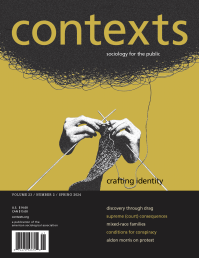PUBLICATIONS
Peer-Reviewed Journal Articles
Robles, Jozef C. 2024. “Remnants of Illegality: DACA, Legal Status, and Unlearning Illegality.” Journal of Ethnic and Migration Studies. Doi: 10.1080/1369183X.2024.2393655
This paper examines transitions between legal statuses as an ongoing negotiated process between undocumented embodiments and legal realities. Rather than viewing legal statuses as mutually exclusive states of existence, I contend that transitioning through statuses leaves behind what I call remnants of illegality – lingering effects of previous legal designations that continue to shape a person’s behavior and worldview even after the person is no longer in that status. Interviews with 20 formerly undocumented/DACA Californians reveal that the remnants of illegality alter participants’ understanding of legal status, everyday behaviors, and understandings of self. Although participants struggle to bridge the gap between their remnants of illegality and legal realities, their stories suggest that they actively work to unlearn these remnants, indicating their potential impermanence. Broadly, these findings propose a new concept for understanding the impacts of illegality and also challenge assumptions about legal status as an idealistic end-goal solution to the condition of illegality.
Place attachment, the emotional bond between person and place, facilitates well-being and belonging for Mexicans in the U.S. However, place attachment research concentrating on Mexican populations has not explored a key site for placemaking—the ethnic enclave. Thus, we draw on twenty interviews with Mexicans in the U.S. to examine how individuals form close connections to La Cuatro, an ethnic enclave in California. Despite the overall positive nature of their emotional connections within the enclave, our model uncovers paradoxical and recursive outcomes. While place attachment promotes a sense of belonging within La Cuatro, these emotional bonds are deeply tied to broader experiences of social alienation in areas outside the enclave. This alienation stems from three primary factors: (1) legal status or lack thereof, (2) racialization, and (3) pervasive anti-immigrant socio-political ethos. We propose a recursive model of place attachment that considers social context to explain the placemaking processes of marginalized racial and ethnic groups in public social spaces. This model problematizes the experiences of marginalized communities, such as Mexican immigrants and their descendants, and provides a theoretical framework to examine the interplay between place and broader society.
Robles, Jozef C., and Devon Thacker Thomas. 2023. “Placing Mexican Ethnic Enclaves: Toward a Recursive Model of Place Attachment.” Critical Sociology 50(7-8):1223-1239. https://doi.org/10.1177/08969205231216429
Other Written Works
I detail the emotional landscape navigated by both immigrants and immigration agents within the U.S. immigration system. Drawing from personal experiences during my status-adjustment journey, I highlight the profound emotional labor required by immigrants facing the system's uncertainties and by agents adhering to institutional norms of stoicism. Through anecdotes, I underscore how both groups manage their affective states amidst high-stakes encounters, revealing moments of humanity and emotional conflict within an impersonal and rigid bureaucratic structure. The narrative sheds light on the dual pressures faced by immigrants and agents, emphasizing the significant emotional regulation embedded in their interactions.
Robles, Jozef C. 2024. “Agents of Affect: The Emotional Interactions Between Immigrants and Immigration Agents.” University of Oxford, Border Criminologies. https://blogs.law.ox.ac.uk/border-criminologies-blog/blog-post/2024/09/agents-affect-emotional-interactions-between-immigrants
Robles, Jozef C. 2023. “Navigating the Path to Legal Status: A Three-Part Series.” Contexts Magazine. https://contexts.org/blog/navigating-the-path-to-legal-status-part-one/
In this three-part series, I share the deeply personal journey as an undocumented immigrant obtaining U.S. legal residency. This series captures the emotional and psychological toll of legal violence and the dehumanizing aspects of the U.S. immigration system. Through my experiences — from invasive medical examinations in Ciudad Juarez to the anxiety-ridden immigration interview – I shed light on the systemic barriers and enduring stigma faced by immigrants, culminating in a bittersweet triumph that leaves invisible scars and a continued sense of alienation in the United States.
Chapters in Edited Volumes
Irene I. Vega, and Jozef C. Robles. Forthcoming.“Migrants and Legal Controls.” In De Gruyter Handbook of Political Control, edited by J. Earl and J. Braithwaite.
America’s reputation as a “a nation of immigrants” contrasts starkly with the stringency of its immigration policies. The U.S. immigration system has always alternated between a project of racial selection and exclusion but has become increasingly punitive over time. The punitive turn in immigration has not been colorblind, as Latinx people have long borne the brunt of the U.S. government’s border enforcement, detention, and deportation policies. The U.S. immigration enforcement system’s disproportionate impact on Latinx communities has led scholars to conclude that immigration law inscribes racialized illegality and criminality onto Latinx people creating exclusion and marginalization across generations.
In this entry we examine the repressive function and effects of U.S. immigration enforcement as an example of Layer 2, “controlling subpopulations” in Earl and Braithwaite’s “Layers of Political Repression” model. In keeping with the handbook’s focus, we define repression as “actions or policies that curtail or constrain any form of political engagement” (p. 228), including but not limited to social movement repression. Our goal is to connect the literature on immigration enforcement, which has demonstrated how federal and local control mechanisms target Latinx immigrants, into broader conversations about repression and collective responses to it in different parts of the country and by distinct stakeholders. Our argument is that racially targeted immigration enforcement produces an array of responses from Latinx immigrants and their allies, some of which can depress political engagement but others that may serve as a basis for collective organizing.
SELECTED RESEARCH PRESENTATIONS
Commercializing Ethnicity: Latina Herbalife Entrepreneurs & the Dissemination of Health Knowledge. Latinx Studies Association Conference. Tempe, AZ, forthcoming April 2024.
Remnants of Illegality: The Transformative Effects of US Immigration Law Post Status Regularization. CINETS - Crimmigration Control Conference. Portland, OR, March 2024.
Remnants of Illegality: DACA, Legal Status, and Unlearning to be Illegal. American Sociological Association Conference, Philadelphia, PA, August 2023.
It’s Not La Cuatro Anymore, it’s Downtown Santa Ana: Explorations of Latinx Placemaking and Place Disruption. Pacific Sociological Association, San Diego, CA, March 2021.
Losing Place: The Impacts of Gentrification on Mexican Ethnic Enclaves. California Sociological Association, Riverside, CA, November 2020.




